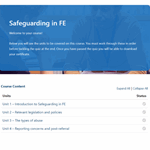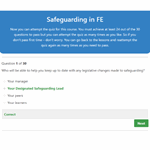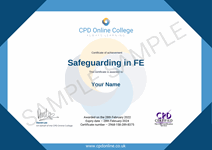Safeguarding in Further Education CPD Course
Online CPD course
CPD Online College
Summary
- Exam(s) / assessment(s) is included in price
Add to basket or enquire
Overview
This course will introduce you to safeguarding in further education, including why it is important, relevant legislation and policies that apply to further education sectors, the types of abuse students may encounter, including the possible signs and symptoms. As well as reporting concerns and post-referral.
CPD
Course media
Description
All staff in Further Education providers have a statutory duty to safeguard and promote the welfare of children in the same way that school staff do. Further Education colleges and providers also have a statutory duty to protect vulnerable adults who study on their premises. This course is suitable for all staff working in Further Education, including college tutors, counselling staff, classroom support staff, admin and facilities support staff and FE college management.
When it comes to the safety of learners, it is important that all FE staff know the key principles of safeguarding. You will explore the relevant safeguarding legislation that applies in further education, as well as learning about learners rights, as well as your responsibilities towards them. You will look at how legislation changes between learners younger than and older than 18 years old.
You will explore why policies are important and your responsibilities under your FE provider’s safeguarding policy.
Unit 3 will explore in detail the different types of abuse, including emotional abuse, sexual abuse including, sexting, child sexual exploitation, grooming and upskirting. Physical abuse including domestic abuse, honour-based violence, forced marriage, FGM, eating disorders and self-harm. Neglect and acts of omission, bullying including online abuse, prevent, radicalisation and extremism. Child criminal exploitation including, county lines and modern slavery. Financial abuse, mate crime, peer-on-peer abuse, discrimination and hate crime and organisational/institutional abuse.
All allegations of abuse need to be taken seriously whether made by a learner, a member of staff or other service provider. The primary aim of safeguarding is to keep an individual safe and prevent further abuse from occurring. During unit 4 you will cover the types of disclosures, how to respond to them, how to record and report concerns and what happens post-referral.
In order to complete the course, you must achieve 80% or more in the final multiple choice quiz.
You will earn 3 CPD points on completion of the course, this course will take around 3 hours to complete and the certificate will last for two years.
- Fully CPD registered
- Completed online with instant downloadable certificate
- Suitable for those working in further education settings
- Fully printed certificate posted next day
- Complete the online multiple choice assessment as many times as you need to pass
Units covered
- Unit 1 – Introduction to Safeguarding in Further Education – In the first unit of this safeguarding in further education course, you will examine what safeguarding in further education is, as well as safeguarding learners with special educational needs and disabilities and what safeguarding risk factors are.
- Unit 2 – Relevant legislation and policies – In this unit you will explore the relevant safeguarding legislation, why it is important and how safeguarding legislation changes between learners younger than and older than 18 years. You will also explore your responsibilities under your FE provider’s safeguarding policy.
- Unit 3 – The types of abuse – This unit will examine the different types of abuse, including county lines, modern slavery, grooming, upskirting, mate crime, peer-on-peer abuse, etc. Each type of abuse will be explained in detail, as well as the possible signs and symptoms of each.
- Unit 4 – Reporting concerns and post-referral – In the final unit of the safeguarding in further education course you will explore the different types of disclosures, how to respond to disclosures, how to record and report concerns, the role of the Designated Safeguard Lead and what happens post-referral.
Who is this course for?
Suitable for anyone involved with Further Education, and anyone with responsibilities of safeguarding in FE.
Requirements
You are required to complete a multiple choice quiz at the end of the course, you must achieve 80% or above to pass, if you don't pass first time, you can re-take as many times as you need to pass.
Career path
Suitable for anyone involved with Further Education, and anyone with responsibilities of safeguarding in FE.
Reviews
Currently there are no reviews for this course. Be the first to leave a review.
Legal information
This course is advertised on reed.co.uk by the Course Provider, whose terms and conditions apply. Purchases are made directly from the Course Provider, and as such, content and materials are supplied by the Course Provider directly. Reed is acting as agent and not reseller in relation to this course. Reed's only responsibility is to facilitate your payment for the course. It is your responsibility to review and agree to the Course Provider's terms and conditions and satisfy yourself as to the suitability of the course you intend to purchase. Reed will not have any responsibility for the content of the course and/or associated materials.






